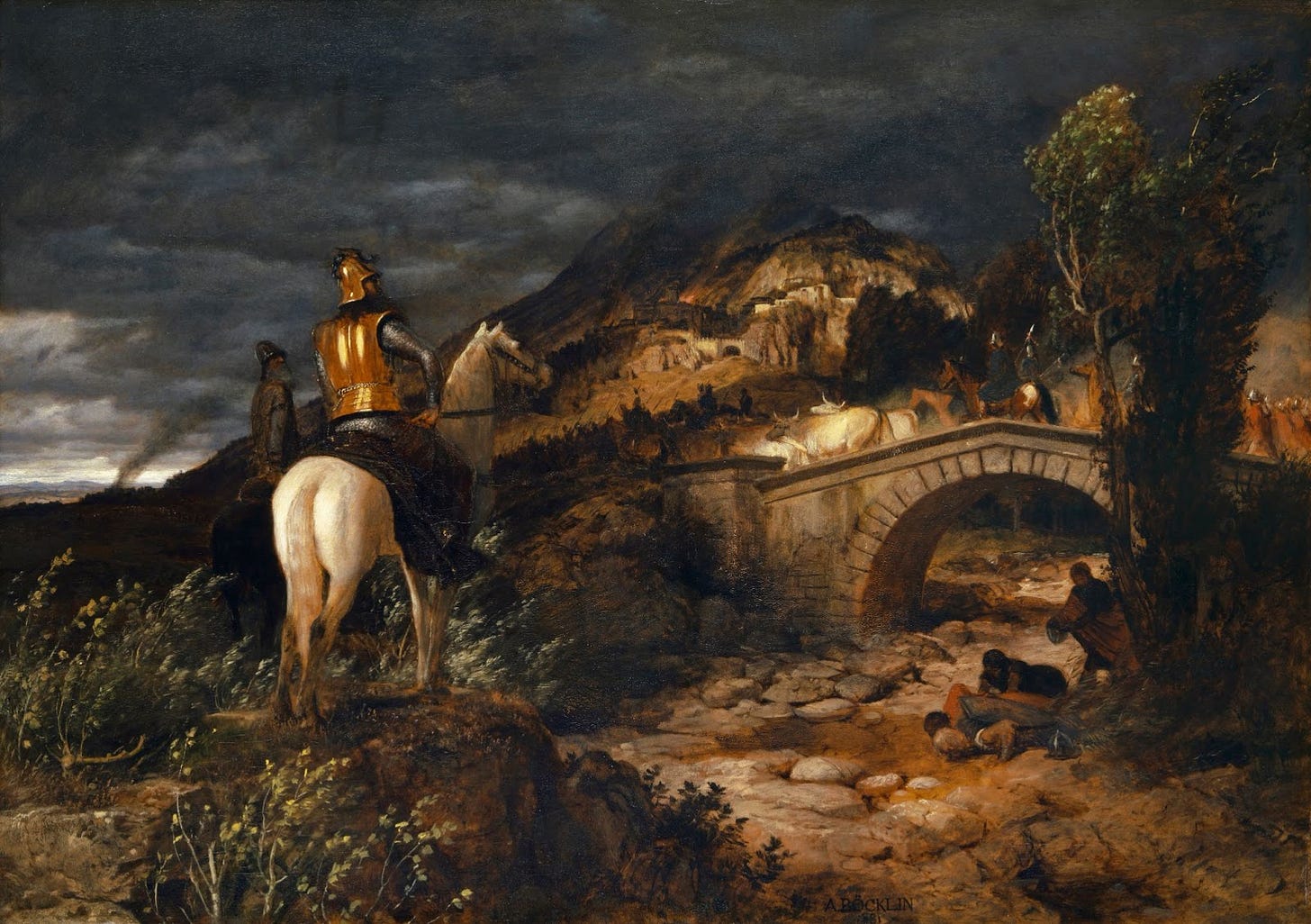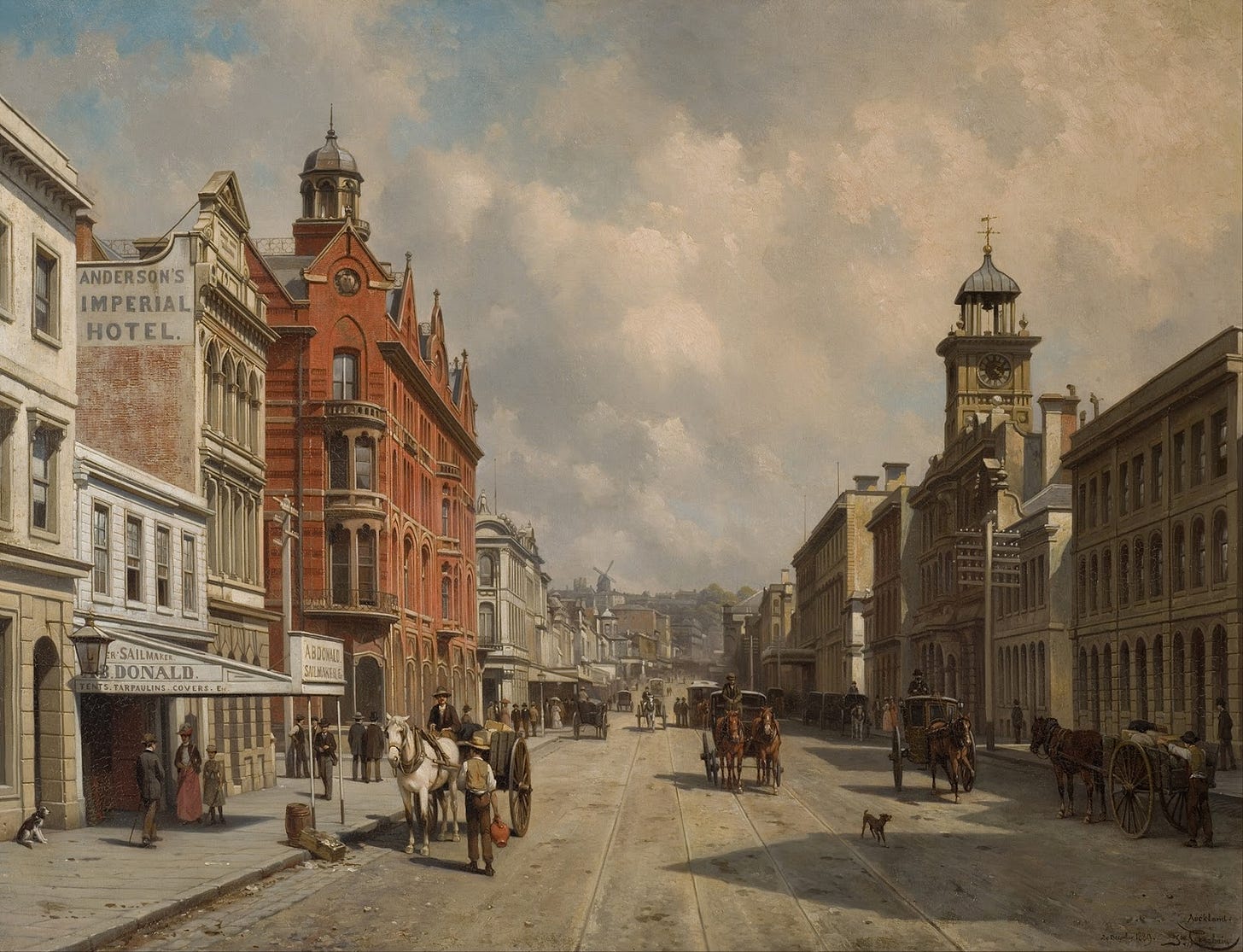Somewhere on the banks of the Rhine, AD 64
Lucius looks over the wares on the table in front of him: stacks of squirrel pelts, fox skins, and the thing he’s really interested in: a small leather pouch of cloudy amber. He tries not to linger on it for too long.
The man opposite him barks something in his crude barbarian language. What was his name again? Gunthihari?
I’m sure it means ‘breaker of skulls’ or something dreadful like that, thinks Lucius.1
Gunthi-whatever’s translator speaks, his broken Latin barely indistinguishable from grunts, “What will you give the king for his goods?”
Immortal gods, to these Germani, a man is a king if he’s got more than a pair of pigs to his name!
“Tell the… king,” says Lucius, “that I’d be happy to take it all for a pound of silver by weight.”
The translator turns to Gunthi-so-and-so and says some gibberish, but Lucius can distinctly hear that he didn’t bother to translate the Latin word ‘by weight’: pondo.
Behold the civilizing mission of Rome, bringing weights and measures even to the barbarians.
The so-called king seems not altogether pleased by the offer, and says something to the translator. But Lucius can make out another Latin word in there: catilus, although their thick tongues have mangled it.
Ah, so they want the catilus, he thinks, and looks down at the small bronze bowl on his side of the table.
Lucius doesn’t wait for the translator to relay the message. He understands well enough.
“You want the catilus, do you?” he says loudly, slowly enunciating every syllable. He picks up the bowl. “This is a beautiful one, though. Look how shiny it is.”
He holds up the catilus to the light and twirls it. All part of the act. These barbarians love shiny things.
“I could give it to you… along with one pound of silver by weight. Do we have a bargain?”
The interpreter relays the message. Again, Lucius hears a Latin word in there, this time referring to him: caupo ‘merchant.’ He gives them a little credit: they pronounced that one more or less correctly. Maybe barbarians can be taught after all.
Gunthihari listens to what the interpreter says, scowls, and then holds out his hand.
“He wants to look at the bowl?” asks Lucius, turning to the interpreter. “I assure you, it is of the highest—”
Gunthihari snatches the bowl and flips it over to look at the bottom. Then he bursts out laughing.
“Like the one my grandfather took from a dead soldier when he fought against your Varus at the Teutoburg Forest,” he says, in surprisingly good Latin. “Be a good caupo. Give three pondo silver and the catilus.”
Lucius’ blood runs cold. The Teutoburg Forest… the disaster of Varus… he’s talking so casually about the worst disaster the Roman armies had ever experienced. And his grandfather was there?
Suddenly, the barbarians around him seem taller somehow, more muscular. Maybe he should give the king what he wants and be thankful he’s not just taking it from him.
Then he realizes: This is a negotiating tactic. Don’t let them faze you. You’re a citizen of Rome, by the immortal gods! They wouldn’t dare to harm you.
“Well,” said Lucius, “if the catilus has such sentimental value for you, I suppose I could let it go… along with, say, two pondo silver.”
“Good caupo,” says Gunthihari.
It seems they have a deal.
You're reading The Dead Language Society. I'm Colin Gorrie, linguist, ancient language teacher, and your guide through the history of the English language and its relatives.
Subscribe for a free issue every Wednesday, or upgrade to support my mission of bringing historical linguistics out of the ivory tower and receive two extra Saturday deep-dives per month.
If you upgrade, you’ll also be able to join our ongoing Beowulf Book Club and watch our discussion of the first 400 lines right away.
Live on a street? Thank a Roman!
The Latin words that Lucius and Gunthihari used to manage the practicalities of trade between Roman and barbarian all ended up in the barbarians’ language, which they took back home and shared with their barbarian friends. And their kids. And their kids.
And so these Latin words came to exist even in the distant descendant of that barbarian language: English. The words pondo ‘by weight’, catilus ‘a type of bowl’, and caupo ‘merchant’ ended up in English as pound, kettle, and cheap.
But if you look at these words, they don’t look like much more obvious Latin loanwords like interact, magistrate, and communication. The reason words like pound, kettle, and cheap look so un-Latin to us is that they came into English extremely early on, before English was even a language.
The ancestor language that received these early Latin loanwords was some early form of Germanic. So these words were already part of the language when English later split off from the other Germanic languages. As a result, these Latin loanwords grew up alongside other English words, subject to the same sound changes that have given English its unique flavour.
From the types of words the Germanic peoples2 borrowed from the Romans, we can glean what sort of circumstances they were borrowed under. To be sure, much of it has to do with trade and trade goods, such as pound, kettle, and cheap.
But trade wasn’t the only domain where Latin words were borrowed. There are lots of Latin loans having to do with construction and infrastructure, a specialty of the Romans:3
wall, from vallum ‘rampart’
pit, from puteus ‘well’
tile, from tegula ‘tile’
street, from (via) strata ‘paved (road)’
post, from postis ‘post, pedestal’
From the 1st to the 5th centuries AD, the border of the Roman Empire with the Germanic-speaking world was more of a permeable membrane than an impenetrable barrier.
Goods, ideas, and words — not to mention people — travelled back and forth across it. Roman goods, such as wine, pottery, and metalwork, were sought after by Germanic tribes, just as furs and amber flowed from Germanic-speaking lands into the Roman world.
Another thing the Romans imported from the Germanic world was people, in particular, soldiers.
Men speaking various Germanic dialects and languages were recruited into the Roman army. There, they would have been exposed to a form of Latin called by scholars today sermo castrensis, or ‘camp speech.’ After their term of service, they may have returned to their communities along with the Latin words they spoke with their comrades in arms.
The Germanic leader Arminius, who was responsible for the ‘disaster of Varus’ I mentioned in the opening vignette, was a product of this cultural exchange.
He was born around 18 BC, the son of a chieftain of the Cherusci, a Germanic tribe allied to the Romans. He came to Rome around AD 1 to serve in the Roman army, where he learned Latin and even became a Roman citizen.
Only later, in AD 9, did he turn on Rome and deal the Romans one of their greatest defeats at the Battle of the Teutoburg Forest.
At the higher end of the social hierarchy, Germanic aristocrats often sent their sons into Roman territory as part of diplomatic arrangements to serve as hostages: guarantors of good behaviour on the part of their fathers. These children would also receive a Roman education and become accustomed to the Roman way of life, including the Latin language.
Whether through trade, migration, or military service, there were plenty of opportunities for speakers of Germanic languages to borrow words from Latin. But there has been contact between Latin and Germanic languages for 2000 years, all the way to the present. So, how do we know that these loanwords arrived in the very earliest stage of this contact?
The secret is in the shape of the words themselves.
Latin words in stealth mode
The reason we know these loanwords came into English early is that they have the shape of English words: pound comes from Latin pondo ‘by weight’, but it sounds just like a native English word like hound, from Old English hund; ditto cheap from Latin caupo ‘merchant’ and reap, from Old English ripan; and kettle, from Latin catilus ‘small bowl’; and settle, from Old English setlan.
Compare those to the shape of later medieval loanwords from Latin (many through French), such as nature, religion, and university; or to later loanwords such as peninsula, curriculum, and alumnus.
All these later loanwords have the characteristic polysyllabic shape of Latin words, although in the case of the medieval loanwords, the Latin endings have been filtered through French, which is why we have university rather than universitas. But the later loanwords are more or less unadapted Latin, with the -us, -a, -um still hanging off the end.
In the case of the early loans, these endings have utterly disappeared. No trace remains in the word kettle of the -us of catilus. Equally vanished is the -o of caupo and pondo in cheap and pound. These words have been worn down to monosyllables, or, in the case of kettle, something close to a monosyllable.4
This reduction to monosyllables is a larger trend that happened in the development of English out of its Proto-Germanic ancestor. For example, the monosyllabic Modern English hound comes from Old English hund, but Old English hund comes from something longer, the disyllabic Proto-Germanic *hundaz.5
Another reason these early loanwords seem to fit English so well is that their sounds have been ground down over the centuries by the same sound changes that have shaped native English words.
So the au sound in Latin caupo was transformed into the sound we spell ea (and pronounce like ee) today, just like the au sound in Proto-Germanic *baumaz became Modern English beam.
Latin has always been a part of English
These early Latin loanwords into English challenge the usual picture we have of the history of English, which is something like a myth: In the beginning, the language was “pure” Anglo-Saxon, with nothing but inherited Germanic words in it. Then, the Norman Conquest happened, and the English language lost its “purity” for all time and became inextricably mixed with French.6
But, as we’ve seen here, the English language was never purely Germanic. Even before English became English, it had adapted loanwords from Latin.
This early influence from Latin dates back before any Germanic language was written down, and indeed before most of the Germanic languages could even be called separate languages.
The Latin language (and French, which is Latin + 1000 years of development) has been a constant presence throughout the history of English.
It started with early loans like pound, kettle, and cheap. It intensified with the hundreds of Latin loanwords that came into English through the influence of Christianity and literate Christian culture, including abbod ‘abbot,’ engel ‘angel’, deofol ‘devil.’7 And it became transformative with the Norman conquest and the mass borrowing from Latin that accompanied the Renaissance.
But the roots of Latin influence are as deep. Even a poem as early as Beowulf, which many scholars think reflects an archaic oral tradition, has around two dozen loanwords from Latin:8 gigant ‘giant’ (from Latin gigas ‘giant’, another loanword ultimately from Greek) ancor ‘anchor’ (from Latin ancora), camp ‘battle’ (from Latin campus ‘field’), segn ‘banner’ (from Latin signum ‘mark, token; banner’), and — last but not least — draca ‘dragon’ (from Latin draco, again, ultimately from Greek).
So there has never been an English without Latin. The first ancestor of the Anglo-Saxons who crossed the Channel crossed it with Latin words in tow.
Contrary to the stereotype that Latin has provided English with its fancy vocabulary, this earliest layer of Latin loanwords wasn’t for high-minded pursuits like philosophy or science, but for the day-to-day business of building, trade, and war.
Learning this allows us to exorcise a myth about English, which George Orwell put so well into words: “bad writers… are nearly always haunted by the notion that Latin or Greek words are grander than Saxon ones.”
Go tell any bad writers you know that it’s time for an exorcism: you need not be haunted by the supposed grandeur of Latin if it includes such humble words as pit, kettle, and kitchen!
He wasn’t so far off. Gunthihari means ‘battle army.’ It would later become the name Gunther.
I’m using Germanic peoples here as a shorthand for ‘peoples who spoke a Germanic language.’
These words are hard to date exactly: some may have come into English after the language had arrived on the island of Britain. But nevertheless, they’re very early.
Two-syllable English words with endings like -le, -er, -en often behave like one-syllable words in, for example, poetry or songs. Think of Joy to the World’s “And heav’n and nature sing.”
The asterisk indicates that this word was never written down anywhere, but has been reconstructed, in this case, to a high degree of confidence.
Opinions are divided as to whether this was a positive development.
Many of these religious loanwords were Greek in their ultimate origin, but came into English after having been borrowed into Latin.
According to the count in the introduction to Klaeber’s 4th edition of Beowulf (p. cxxi).








I accidentally learned Spanish. Five years of Latin left me with the realization that Spanish is ( sorry) Lengua latina degradada.
These early borrowings all predate writing, so the words never had an exotic spelling. That definitely plays a big role in masking their roots, along with the passage of time.
Borrowings in recent centuries seem to nearly always preserve a word’s exotic spelling, so recent foreign loan words really stick out.
These spellings are routinely mispronounced by speakers applying English phonetic rules. Alumni is pronounced to rhyme with “eye” rather than “knee.” Bon appetit in English often has an audible t at the end, unlike in French. Rodeo is pronounced as if it rhymes with “polio.” English speakers seem to really resist changing exotic spellings, but are happy to butcher the pronunciation.
In fact, I can’t think of any recent loan words that are semi-faithful phonetic borrowings, rather than borrowed with their original spelling intact and mispronounced by speakers who read the words as if they are English.
In the 17th and 18th Centuries in America, English-speaking settlers borrowed animal names and place names from native Americans and spelled them as in English - in words like raccoon, Massachusetts, etc. Probably because these had no written form.